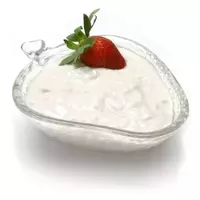Yogurt

In addition to milk, sour cream and kefir, yogurt also belongs to the most popular dairy products. This tender delicacy not only has excellent taste qualities, but also can favorably act on the human body. This is due to the presence of numerous beneficial properties of yogurt.
Meanwhile, the culinary history of this delicious dairy product has its origins in Ancient Thrace, whose location is currently determined by the territory of present-day Bulgaria. In those days, one of the main activities of the local population was sheep farming, so the milk of these animals was used to produce cheese and yogurt.
Like many other fermented milk products, yogurt is the result of the active activity of a special bacterium - the Bulgarian stick, which is so called after the country of its discovery. By the way, for the first time, industrial production of yogurt began only in 1918 and since then this product has become popular in all countries of the world.
You can use yogurt not only as a self-sufficient dish, although this option is recognized as the best. Often, fresh or processed fruits and berries are added to it as a fragrant filler. And yogurt can be a fairly important component not only of numerous desserts, but also of second courses. Many hostesses use it as a natural dressing for a variety of fresh salads and snacks, or add yogurt to baking dough. By the way, the calorie content of yogurt directly depends on the type, fat content and composition of the product, and in general, on average, is about 57 kcal per 100 grams.
Types of yogurt
Currently, the range of dairy products is so extensive that it is quite difficult to stop your choice on anything alone. The same applies to types of yogurt, which vary depending on many indicators. So, for example, based on the fat content of the product, there are yogurts with a slight fat content, and there are those in which the mass fraction of fat reaches 5%.
In addition, there are still a lot of types of yogurt, among which a drinking product is distinguished, which is therefore called that it should be consumed not with a spoon, but by drinking directly from a bottle. Depending on the composition of yogurt, this product is divided into natural, in which there should be nothing but milk and sourdough, and a product with all kinds of food additives. The latter can be flavors, fruit and berry raw materials, cocoa and many others.
Yoghurt composition
It is known that the shorter the list of components in the finished product, the more healthy it is. The same applies to the composition of yogurt, which should contain exclusively whole milk and live lactic acid bacteria. Everything that is added by manufacturers in addition to these ingredients speaks of the uselessness of the product.
The benefits of yogurt
Undoubtedly, the greatest benefit of yogurt lies in a home-made product, not a purchased treat. The main thing is that it includes the freshest milk and Bulgarian stick. If there is none, you can use industrial yogurt with a shelf life of no more than 3 weeks, then it will be possible to talk about the naturalness of the product.
The human health benefits of yogurt are manifested in the ability to prevent the formation and reproduction of putrefactive bacteria in the intestinal tract. Thus, regular consumption of this product contributes to the effective cleansing of the entire body.
The harms of yogurt
Exclusively in the case of personal intolerance of milk or its components, the harm of yogurt can somehow affect a person and manifest itself in various allergic reactions.
yogurt 57 kCal
Energy value of yogurt (Ratio of proteins, fats, carbohydrates - ju):
Proteins: 4.1 g (~ 16 kCal)
Fats: 1.5 g (~ 14 kCal)
Carbohydrates: 5.9 g (~ 24 kCal)
Energy ratio (bj | y): 29% | 24% | 41%
 Español
Español Français
Français Português
Português Русский
Русский 简体中文
简体中文 繁體中文
繁體中文 日本語
日本語 한국어
한국어 العربية
العربية Türkçe
Türkçe Қазақ
Қазақ Deutsch
Deutsch Italiano
Italiano Українська
Українська
